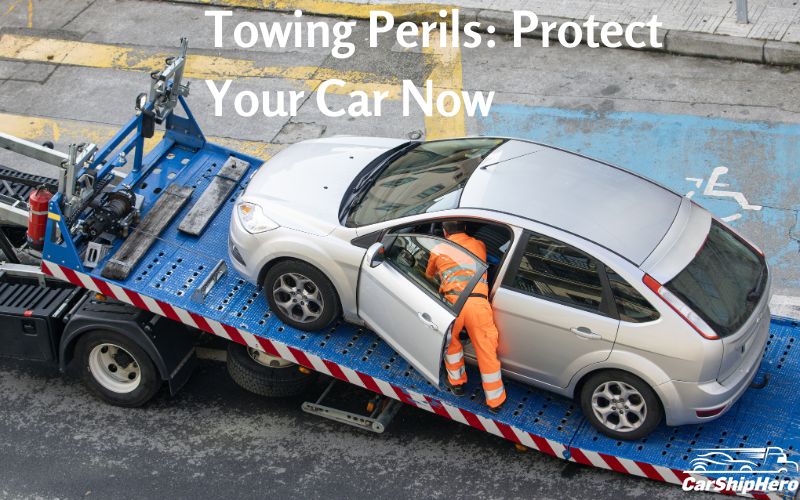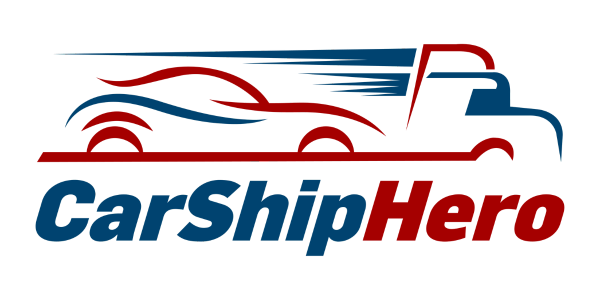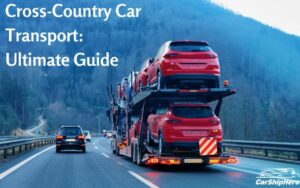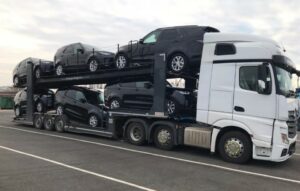Monday to Saturday - 8:00 -17:30
Towing Perils: Protect Your Car Now
To protect your car during towing, choose the safest method like flatbed towing for reduced risk of damage. Consider factors like weight distribution for stability and control. Look out for warning signs of damage such as unusual noises or changes in handling.
Prevent issues by using proper equipment and secure towing straps. Regular inspections can help detect potential problems early. Safeguarding your vehicle from towing perils is essential for its longevity and performance. Understanding these key points is vital for maintaining the safety and integrity of your car during towing.

Common Towing Methods Comparison
Comparing the common towing methods of flatbed, dolly, and hook and chain provides insight into the advantages and disadvantages of each technique for safely transporting vehicles. Flatbed towing, with all four wheels off the ground, is considered the safest and most popular method. Its pros include reduced risk of damage to the towed vehicle and better overall towing efficiency.
Dolly towing involves suspending the front wheels, potentially causing stress on the suspension system. While it is more affordable and easier to maneuver, it can lead to issues with certain vehicle types. Hook and chain towing, once popular, has decreased due to its cons, such as potential undercarriage damage and limitations for modern vehicles. Understanding these differences is essential for selecting the most suitable towing method.
Factors Affecting Towing Safety
Understanding the weight of your vehicle is vital when considering factors that influence towing safety. Proper weight distribution plays an essential role in maintaining stability and control during towing. Road conditions also play a key role in towing safety, as slippery or uneven roads can increase the risk of accidents. Here is a table highlighting the importance of weight distribution and road conditions:
| Factors | Influence on Towing Safety |
|---|---|
| Weight Distribution | Maintains stability and control |
| Road Conditions | Impact traction and braking ability |
Damage Risks and Prevention
To mitigate potential damage risks when towing your vehicle, it is essential to understand the specific perils associated with improper towing methods and implement preventive measures. Warning signs that improper towing is causing damage include unusual noises, leaking fluids, uneven tire wear, or changes in vehicle handling.
Preventive measures can help avoid these risks, such as ensuring proper equipment, like secure towing straps or chains, is used, maintaining correct towing speed, and checking the vehicle’s weight capacity.
Additionally, regular inspections of the towed vehicle before and after towing can help detect any potential issues early on. By following these preventive measures and being vigilant for warning signs, you can protect your car from damage during towing.
Frequently Asked Questions
Can Towing a Car With an Automatic Transmission Cause Any Specific Damage Compared to Towing a Car With a Manual Transmission?
When comparing towing a car with an automatic transmission to a manual transmission, specific damage concerns vary. Automatic transmissions are more sensitive to improper towing methods, potentially causing internal damage. Regular maintenance and professional handling are essential.
Are There Any Specific Precautions to Take When Towing a Car With All-Wheel Drive or Four-Wheel Drive?
When towing a car with all-wheel drive or four-wheel drive, it is essential to avoid damaging the drivetrain. Utilize flatbed towing to prevent strain on the system. Consider the weight distribution and engage a professional to guarantee a safe towing experience.
How Does Towing a Car With an Electric or Hybrid Engine Differ From Towing a Car With a Traditional Gasoline Engine?
When comparing towing an electric or hybrid car versus a traditional gasoline vehicle, differences arise in handling due to the unique powertrain systems. Electric and hybrid cars may require special considerations for towing to prevent damage to their propulsion systems.
What Are the Potential Consequences of Using the Wrong Towing Hitch or Equipment for Your Vehicle?
Using the wrong towing hitch or equipment for your vehicle can surpass towing capacity, resulting in structural damage, brake issues, and accidents. Verify hitch safety by confirming compatibility, weight limits, and following precautions diligently.
Are There Any Legal Implications or Fines Associated With Improper Towing Practices in Certain Areas or Jurisdictions?
Legal implications and fines may result from improper towing practices in specific jurisdictions. Safety precautions, considering transmission types, help mitigate risks. Understanding local laws and adhering to proper towing methods can prevent legal repercussions and guarantee vehicle protection.






